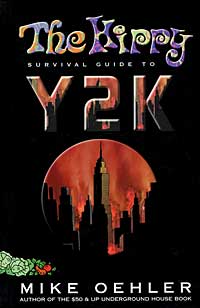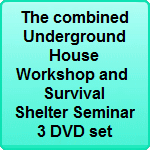
The Hippy Survival Guide to Y2K |
||||||||||||||||||||||||||||||||||||||||||||||||||
|
 Okay, Y2K didn't happen. It was
a non event. But many people feel like something is going to happen, something big. It is the nature of
all things on earth to change and the whiff of catastrophe is in the air. In a society where less than two
percent of the population is providing food for the other 98% and where that two percent is totally dependent
on oil and fallible technology to keep operating, and where close to 100% of the population will have little
if any idea how to survive in the event that services are disrupted, and where there there are powerful
enemies of that society vowing disruption not to mention natures impending revenge for the disregard for her
rules – well when you add it all up it seems not only possible but probable that civilization as we know it is
living on borrowed time. Okay, Y2K didn't happen. It was
a non event. But many people feel like something is going to happen, something big. It is the nature of
all things on earth to change and the whiff of catastrophe is in the air. In a society where less than two
percent of the population is providing food for the other 98% and where that two percent is totally dependent
on oil and fallible technology to keep operating, and where close to 100% of the population will have little
if any idea how to survive in the event that services are disrupted, and where there there are powerful
enemies of that society vowing disruption not to mention natures impending revenge for the disregard for her
rules – well when you add it all up it seems not only possible but probable that civilization as we know it is
living on borrowed time.The first part of The Hippy Survival Guide is charmingly dated. It is recent history, and history of the hippy generation, and should be read and treasured as such. But, as Trish Gannon of The River Journal writes: "As interesting as the first part of the book is it's in the second half where Oehler shines. 'The second thing I'm going to offer you is some simple survival strategies to get you through the trials,' he writes. In 1971 he built his first underground house where he still lives today. It has never had running water, nor (grid) electricity, and is heated solely by the wood that Oehler provides. A self-described back-to-the-lander, Oehler has personal experience in milking cows,butchering livestock, growing organic gardens and preserving what he raises. He's been sharing that knowledge for years as an author and lecturer. "In Hippy Y2K, Oehler takes the reader through the basics, beginning with shelter and heating and covering such topics as potable water, latrines, food supplies and storage. He also includes information on financial strategies. In true hippy fashion, Oehler finishes the book with a plea for changing the world. 'Most of the world's problems can be solved by a change in lifestyle and a shift in spirituality,' he writes, and after 288 pages, you think he just might have a point." Bill London in the Lewiston Tribune says the book has, "solid suggestions for
emergency pit housing and other survival options ... he's done his research well," and calls it,
"appealingly autobiographical ... an entertaining glimpse into the life of one of Idaho's backwoods hermits
– try this book." The customers of Amazon.com give this book a five star rating. Only $14.95 |
|||||||||||||||||||||||||||||||||||||||||||||||||
|
||||||||||||||||||||||||||||||||||||||||||||||||||
|
Mole Publishing Co. PO Box 6003 Missoula, MT 59806 406-493-9540
|
||||||||||||||||||||||||||||||||||||||||||||||||||











